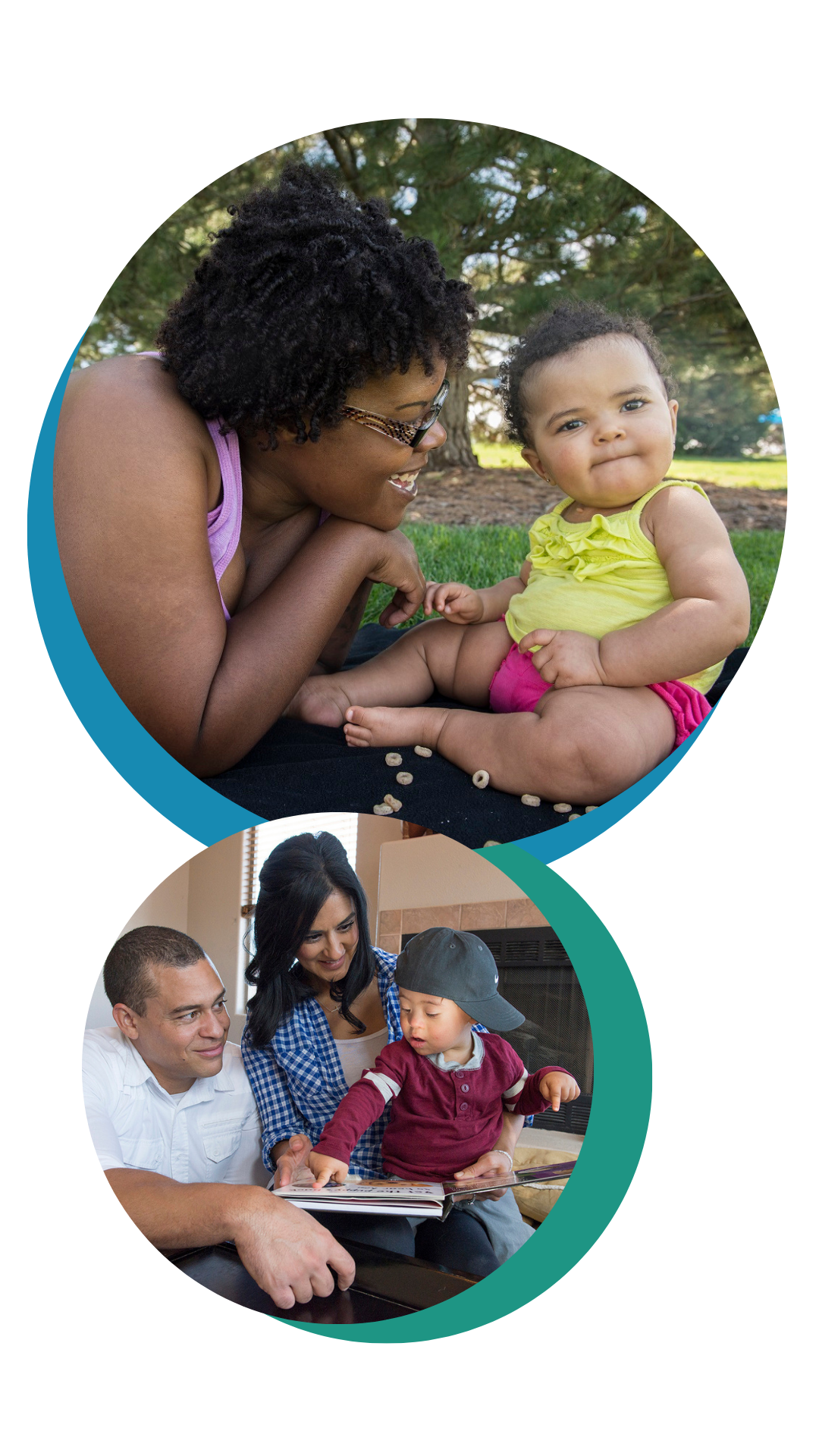Family Infant Toddler (FIT) Program
Are you worried that your child isn’t developing as expected? All children grow and develop at their own pace, but often children need a little extra support. Developmental delays are common in young children, but the earlier you can identify and treat a delay, the better the outcomes.
FIT provides early intervention services to over 14,000 children from birth to age three who have or are at risk of developmental delay—as well as their families.


What is FIT Early Intervention?
ECECD’s Family Infant Toddler program can connect you with local experts to provide a free evaluation to see if your child is experiencing developmental delays or disabilities, or could be at risk. After the evaluation, the FIT provider will talk to your family about whether your little one could benefit from special therapies and supports called Early Intervention.
FIT Early Intervention services are always free, regardless of your income or citizenship status, and can make a big difference in promoting healthy development for babies and toddlers. By the time they finish the FIT Early Intervention program, most children have shown significant improvement or no longer need services at all. New Mexico’s FIT program is ranked as one of the top early intervention programs in the nation and provides ongoing, family-centered services to over 14,000 children statewide.
Looking for a FIT Provider?
See the FIT Providers list located in the materials library. These agencies are funded through a combination of state and federal funds, including Medicaid, IDEA Part C, and private health insurance
How does FIT Early Intervention work?
Step 1: Referral
If you or your child’s Doctor, child care professional or other provider are concerned about your child’s development you can make a referral to the Family Infant Toddler (FIT) Program. Anyone can make a referral, but participation in the program is voluntary.
See the FIT Provider List in the FIT Materials Library to find a list of FIT agencies that can help you find a provider near you.
Step 2: Evaluation
Your local FIT provider agency will set up a time to meet with you to complete a developmental evaluation for your child. Usually, this means that either two or three people will visit you in your home to gather information about your child by asking you questions and observing you and your child together. They will gather information related to:
- your child’s vocalizing
- talking and listening,
- how they move around your home and community,
- their play,
- their sleeping, eating, and dressing/diapering routines, and
- emotional and social relationships.
You will play an important part in your child’s evaluation. The developmental evaluation team members will talk to you about your child’s strengths and needs and will ask you to be involved in the assessment activities. Your child’s developmental evaluation team will include a Family Service Coordinator and two other early childhood development experts. For example, the team may include a Physical Therapist and a Developmental Specialist. Or your team may include a Speech/Language Pathologist and an Occupational Therapist.
Step 3: Service Plan
If your child is eligible for early intervention services, your service coordinator will meet with you and the other team members to develop an Individualized Family Service Plan (IFSP). The IFSP will list the goals and strategies you and the team will use to support your child’s development. The IFSP will also provide your family up with your own early intervention team who will help you meet the goals you have set for your child.
Early intervention team members will provide you with ideas and strategies to promote your child’s development during everyday activities and routines (such as mealtime, playtime, bath time, etc.). This means that early intervention services are often provided within the home and other environments like child care/Early Head Start where you and your child are most comfortable. The early intervention staff work as professional coaches to you, family members, and other caregivers, giving you the skills and confidence to promote your child’s development.
The FIT Program provides Early Intervention services at no cost to families. The FIT Program bills Medicaid and private insurance with the parent’s agreement. A law passed in 2005 requires that all health insurance plans cover up to $3,500 per year in FIT services. The FIT Program does not charge copays or deductibles.
FIT Interagency Coordinating Council (ICC)
The Interagency Coordinating Council (ICC) is federally mandated under the Individuals with Disabilities Education Act (IDEA) Part C to advise and assist ECECD in addressing the needs of New Mexico families of infants and toddlers with or at risk for developmental delay, or with developmental disabilities. ICC works in partnership with the Family Infant Toddler (FIT) Program.
What is FIT and How to Apply?
Do you have questions about how to get started with FIT? Watch these tutorial videos for details. Available in English, Spanish, Diné, and Vietnamese.
Make a Referral
Anyone who has a concern about a child’s development can make a referral. This includes parents, guardians, foster parents and family members, professionals such as pediatricians, other physicians, social workers, nurses, home visitors, childcare providers, or others who have contact with the child.
It is not necessary to determine a diagnosis or a delay prior to making a referral. Simply the fact that you are concerned about the child’s development is enough to generate a referral.
Some situations in which you may make a referral include:
- If you suspect a developmental delay.
If a developmental screening indicates that the child could benefit from a comprehensive developmental evaluation. - If a parent has a concern.
- If you feel the child and family could benefit from a comprehensive developmental evaluation.
- If, as a medical provider, you have identified the child as having a diagnosis that may lead to a developmental delay. Please see our FIT Diagnostic Codes for Eligibility and Billing to learn more.
The Early Show with Alax
The Early Show with Alax and Ask Alax are informative online originals created for the New Mexico Early Childhood Education and Care Department. They’re made for grownups with kids in mind. FIT is featured in the episodes below.

Is my child meeting developmental milestones?
The following is a list of developmental activities that a child is typically learning at different periods from birth the age three. Screening tools such as Ages and Stages Questionnaire can help determine if the child could benefit from a more in-depth developmental evaluation through the FIT Program.
Rights
The following documents explain parents’ rights in the FIT Program:
If you have concerns about the early intervention services that you receive, please call
1-877-696-1472 and ask to speak to one of the FIT Program staff.
Support and Training
You can contact one of the following agencies that provide family support and training to parents within the FIT Program.
- Parents Reaching Out
1-800-524-5176 - Education for Parents of Indigenous Children with Special Needs (EPICS)
